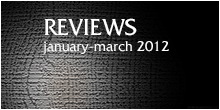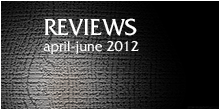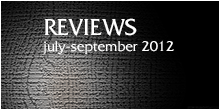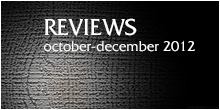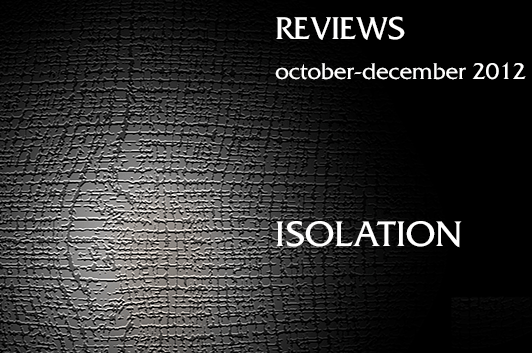
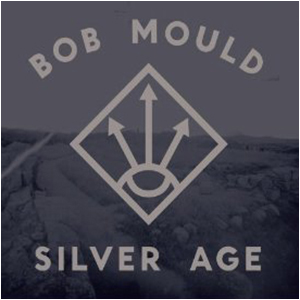
Bob Mould - Silver Age
Demon
Released: 1st October 2012

AR Kane - Complete Singles Collection
One Little Indian
Released: 1st October 2012
If you ever believed in the Big Bang, it happened around 1986 when Londoners Alex Ayuli and Rudy Tambala appeared out of nowhere to blow the rest of the world out of the water. ‘When You’re Sad’, released on the fledgling One Little Indian label (who had only previously released an offering by anarcho-punks Flux Of Pink Indians) is staggering, its crashing and gently feedbacking guitars a perfect dressing for the gorgeously smooth vocals and harmonies they envelop, while an insistent bassline intrudes halfway through to push the song to an all-too-quick conclusion. Accompanied by the haunting ‘Haunting’ where multi-layered and distorted vocals drown under seas of warped guitars, and a longer version of ‘When You’re Young’ (no version could be long enough), this is a truly magnificent piece of work. Moving on to 4AD, then at the peak of its powers, 1987’s ‘Lollita’ EP saw an altogether different approach and if ‘When You’re Sad’ had beaten the Pale Saints by some three years, AR Kane here pre-empted the shoegaze sound that would soon rise to prominence, weaving intricate layers of textured sound. The title track sees an acoustic dressing to a keyboard drone, with heavier guitars occasionally intruding to emphasise a point, while the gentlest of vocals sail through tricky waters with barely a sidelong glance. ‘Sado-masochism Is A Must’ sees a more prominent vocal dominate cataracts of faraway guitars, while ‘Butterfly Collector’ is altogether harder with a volcanic backing ending in a blissful eruption. ‘Anatina’ was the second a-side to the massive MARRS hit ‘Pump Up The Volume’ which ultimately ended in both Colourbox and AR Kane departing from 4AD. It was a fascinating collaboration which seemed to satisfy neither party, but ‘Anatina’ is a gem, Colourbox’s funkier backing and dub insanity in full scale rebellion against AR Kane’s gloriously beautiful, pleading love song.
Rough Trade was the nearest place the band found to a stable home, with two albums and three singles being released before the label went to the wall in 1991. The ‘Up Home!’ EP of 1988 saw the band’s sound become even more transcendental, its many shimmering facets combining to form a breathtaking whole, while the ‘Love-sick’ EP of the same year is gentler, less dominated by guitars, and adopts free-form jazz elements and breakbeats. The last outing on the label, the ‘Pop’ EP of 1989, saw further progression down this different road and is so far removed from AR Kane’s indie roots you might not believe it is the same band, with more straightforward dance and house elements, some dub, funky basslines and a female backing chorus. The collapse of Rough Trade led to a period of relative inactivity after which David Byrne's record label, Luaka Bop, released a 15-song US retrospective of the band's work, entitled Americana, and an EP featuring remixes of ‘A Love From Outer Space’ from the Rough Trade album, i. There was no new album from AR Kane until the not hugely convincing New Clear Child in 1994 and its accompanying ‘Sea Like A Child’ EP, which overlays its tracks with two vocals on an orchestral backing. It’s all beautifully crafted, but without the twisted, weeping guitars doesn’t quite grab you in the same devastating manner.
If you have never listened to AK Kane before the complexity of these tracks and their tortuous journey through an ever-shifting musical landscape will only confuse you. Don’t worry, the band confused us all by cutting new paths others only slowly dared to follow. At their best, few have come close to matching them, and ultimately it is difficult to ascribe their achievements to anything other than the hand of God.
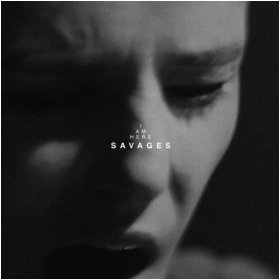
Savages - I Am Here
Pop Noire
Released: 8th October 2012
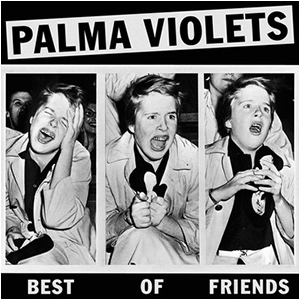
Palma Violets - Best Of Friends
Rough Trade
Released: 22nd October 2012
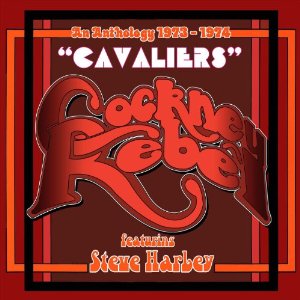
Cockney Rebel - Cavaliers
EMI
Released: 29th October 2012
It was the non-album single of ‘Judy Teen’, released in March 1974, which lifted Cockney Rebel into the glare of the public spotlight. Totally bewitching, though almost completely incomprehensible, it shot up to number five in the charts and paved the way for the band’s second album, The Psychomodo, released three months later which remains a sure-fire classic and certainly takes its place among the very best records made in that decade. Aided by another classic top ten single in ‘Mr. Soft’ (sadly more familiar these days for its use in television adverts for mints) the album reached number eight and remained in the charts for nearly half a year. Again, the band’s approach was totally unique, and the record sounds huge despite its complete lack of electric guitars. Harley’s phrasing is particularly exquisite, drawing words over different lines at will, stressing the wrong syllables and all in his particular tortured tone that will be familiar to anyone who has a liking for early Suede material where Brett Anderson is pretty much Harley reborn. And does anyone do asides like seventies’ artists? Harley’s casual injections are magic – “Destroy!” thrown randomly into a song brings to mind Johnny Rotten who was the last great interjector – and casual ‘oohs’ and ‘aahs’ and the use of handclaps all add to the enjoyment. Just listen to David Bowie’s Ziggy Stardust from the same era and it is full of these glorious little touches; why have they disappeared? Surely it’s just a matter of confidence.
Sadly, The Psychomodo was the last album from this gathering of Rebels as band differences led to a rancorous split in the ranks, with Harley and drummer Stuart Elliott moving on to create a new group, electric guitars and all, where they would achieve even greater chart success with such numbers as ‘Make Me Smile (Come Up And See Me)’. Cockney Rebel Part Two certainly created some great music, but possibly lacked some of the magic of the band’s original version, lacking the gorgeous violin work of Jean-Paul Crocker, the fairground organ-style of Milton Reames-Jones, the enormous basswork of Paul Jeffreys (who sadly died aged 36 in the 1988 Lockerbie disaster whilst on his honeymoon), and the sheer verve that could see them end their guitarless second album with the repeated phrase, “Oh dear, look what they’ve done to the Blues.”
This new 4CD collection showcases remastered versions of both The Human Menagerie and The Psychomodo with the addition of all of the non-album single a-sides and b-sides. The third disc features alternative versions and mixes and is previously unreleased in its entirety, whilst the fourth disc has live BBC In Concert recordings from 1974, two tracks from The Old Grey Whistle Test of the same year, plus three tracks from a John Peel session. All four nicely carry the EMI logo of the day, mirroring the old seven-inch singles, though the sixteen page booklet, featuring a brief essay from Harley and details of the tracks, could have been a little more comprehensive and the cover artwork a little more impressive. Still, it’s a fine collection and if you like alternative music and are inquisitive as to the artists who helped influence it, you should own this record. Quite simply unique.

Pete Fij & Terry Bickers - I Don't Give A Shit About You
Same
Released: October 2012
As a taster the duo have released a free download of one of their songs which can be accessed here and it’s a stunner, one of those gorgeously maudlin songs where the lyrics begin to tell one story, lose their way in a tangle of nonsensical superlatives, and finally fade in the forlorn acceptance they were hopelessly wrong from the start. Fijalkowski always had one of the most expressive voices in alternative music, and his vocal resonates with hurt as the whole mood swerves from determined firmness into emotional uncertainty with the simple backtracking phrase, “But I would have ...”, so beautifully sung it hits you hard inside. “I would have taken a bullet for you from a grassy-knolled gun,” he explains before begging, “So please, please, please get out of my mind.” Not a chance. We’ve all been there. And where Fij can emote with his vocals, Bickers can do every bit as well with his guitar; his contribution is perfect, never breaking the mood of entrapment but cruelly heaping on more sadness with the sheer lightness of his touch. Add the engaging vocal harmonies, the swish of stings on changing chords and the gentle vocal outro and you have one very fine record indeed, one that grows and grows with every play. The new year seems a million miles away.
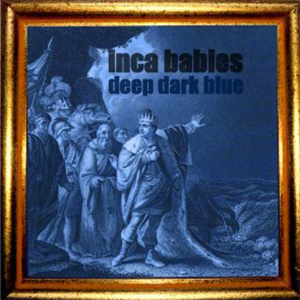
Inca Babies - Deep Dark Blue
Black Lagoon
Released: 5th November 2013
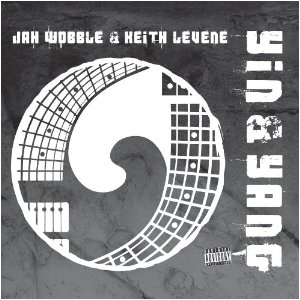
Jah Wobble & Keith Levene - Yin and Yang
30 Hertz
Released: 12th November 2012
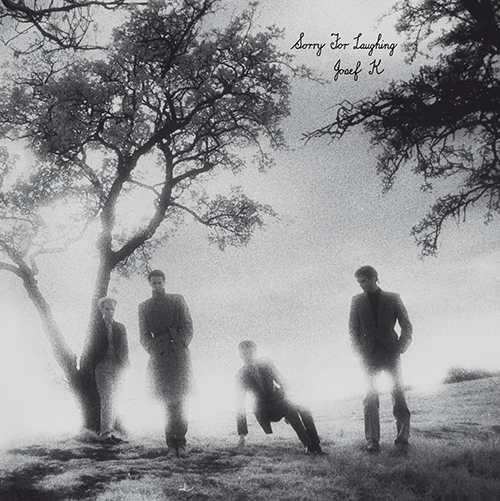
Josef K - Sorry For Laughing
LTM
Released: 26th November 2012
Early independent label Postcard, based in Glasgow, was one of the fabulously diverse labels to spring up in the wake of punk, their initial aim being to release records only by what they considered to be the best band in Glasgow (Orange Juice) and the best band in Edinburgh (Josef K). Both of these groups had a leftfield pop sensibility, being unafraid of embracing funky backdrops to their music yet lacing them with a scything post punk guitar sound. Assuming almost legendary status in its relatively brief lifetime (encompassing just thirteen releases and ultimately expanding to produce records by four different groups), Postcard successfully launched the careers of Orange Juice and latecomers Aztec Camera, and though Josef K never matched the commercial success of those artists, their darker outlook on life and uncompromising approach to their art made them by far the most intriguing of the label’s bands.
Inspired by artists such as Pere Ubu, the Subway Sect and touched by the melancholic solemnity of Joy Division, Josef K released two critically acclaimed singles before heading to the studios in November 1980 to record their debut album, Sorry For Laughing, which was due to be released early in the new year as Postcard 81-1. The album never saw the light of day and was quietly scrapped, ostensibly because the band had been far happier with the sound they had achieved recording a single in Belgium which they felt better captured the abrasive edge they achieved when playing live. Only a handful of test pressings ever made it on to vinyl though some of the tracks were ultimately sent to John Peel to be used as sessions. Sorry For Laughing therefore became one of the indie world’s great lost albums (despite eventually seeing the light of day as part of a hopelessly rare two album CD release in 2002). Now, for the first time, Sorry For Laughing has been given the stand-alone release it always deserved, in a vinyl-only edition, with the original planned burned-out cover art and a bonus CD of the twelve demos the band recorded in 1979 when they were still known as TV Art and were searching for a record deal.
How the band considered the sound of Sorry For Laughing to be ‘slick’ and ‘flat’ is almost beyond comprehension as its twelve tracks play out. Indeed, its double guitar sound captures beautifully the spiky aggression of the best of the post punk bands, while the songs are lifted by a remarkable musical proficiency and a knack for making the most dissonant guitar tones sound like a choir of angels. Paul Haig’s resigned vocals add to the pleasingly downbeat mood which Malcolm Ross fails to break through despite his astonishing versatility as his guitar scrapes and spits and empathetically chases the rhythm section through stall and surge. There are so many highlights. Opener ‘Fun & Frenzy’ drives as if it is late for its own funeral, ‘Heads Watch’ bristles with venom before dipping itself into the ocean of sparkling virtuosity, the archetypical ‘Drone’ heaves under the weight of a morass of ideas, and ‘Variations Of Scene’ takes its place in discordant heaven. Even ‘No Glory’ emerges as the best alternative take on ‘David Watts’ you’ll ever hear.
If you’re a fan of the post punk sound, spiky pop music that both thrills and unnerves, then you can’t live without this record. Josef K could quite easily have gone on to forge a successful career on the darker fringes of the mainstream had they not been overburdened by press expectation and the straitjacket of their own puritanical approach to their music. All too quickly they lost momentum and fell apart acrimoniously, leaving the failure to release Sorry For Laughing as one of independent music’s greatest mistakes and a warning to all up and coming bands that while compromise may be a dirty word, if you don’t learn to bend a little in the wind, ultimately something will break.
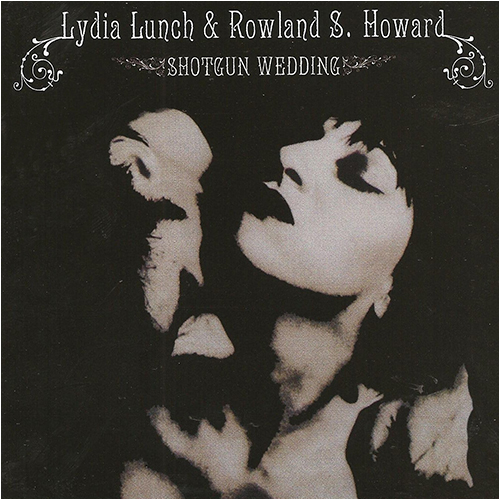
Lydia Lunch & Rowland S. Howard - Shotgun Wedding
Cherry Red
Released: 26th November 2012
Though established as one of the early faces of the New York punk movement, and continually linked with the more darker visionaries of alternative music, Lunch's work can be enfuriating at times with the singer mumbling along to interminable drones that seem to lead nowhere, but here she comes alive, no doubt her enthusiasm lifted by the sheer genius of her collaborator. Anything Howard plays on is worth a listen and any up and coming guitarist should take a step back and study the uniqueness of his approach. On Shotgun Wedding Howard demonstrates how to fill a song with glorious riffs while simultaneously taking them off road into unexplored territory; at other times his subtlety is awe-inspiring, the few notes he hits speaking volumes. The original nine-track album here contains three covers including Led Zeppelin's arrangement of the gospel standard 'In My Time Of Dying' where the bombast is replaced by the lightest of touches to create a quite affecting contemporary blues outing. Lunch's fine vocals are perfectly adorned by Howard's sensitive, otherworldly contribution, and the other covers maintain this high standard. Jeremy Gluck's 'Burning Skulls' opens the album (Howard played on the original) pulsating heavily through Howard's spiralling riffs and wayward solos. Lunch again convinces, seething anger, while on 'Black Juju', written by Alice Cooper bassist Dennis Dunaway and included on that band's excellent Love It To Death album, the duo again give the original a good run for its money, their version carrying quite notable power.
The cover versions sandwich six originals, some of which work better than others. Lunch's 'Solar Hex' is driven along by a purposeful vocal which Howard attempts to divert to another planet, Howard throws the kitchen sink into the pleasingly spiky 'Pigeon Town', and the ominous 'Cisco Sunset' hints at Birthday Parties past, guitars coughing and telling the darkest of tales. 'Incubator' builds slowly but maybe doesn't quite finish the job, 'Endless Fall' is intriguingly spidery but leaves unanswered questions, and for all Howard's impressive efforts 'What Is Memory' is dragged down by Lunch's unnecessarily spoken word vocal. Make no mistake, though, this is an impressive piece of work and a few raised eyebrows are a small price to pay for the general inventiveness and refreshing, angular approach. And that is not all as Cherry Red have added some bonus tracks to this new edition, with the admirable 'Some Velvet Morning' included along with five well-recorded live numbers gathered from European and Australian gigs. Seventy-nine minutes of innovative music for eight quid can't be bad and as today is the third anniversary of Howard's death, sadly there won't be any new material from him to enjoy.
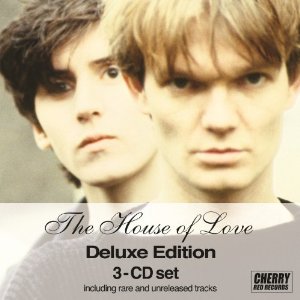
The House Of Love - Same (Deluxe Edition)
Cherry Red
Released: 26th November 2012
The album having been unavailable for some time, Cherry Red have now released this 3CD deluxe package in a four-fold digipak which contains all of the band's work for Creation before they signed for major label Fontana. The first disc contains the original album along with the two demo tracks which originally accompanied that release as a bonus seven-inch single. The second disc houses all of the tracks from the band's four singles and the German mini album along with some rare and live recordings. The third disc contains previously unreleased demos and mixes, featuring a good number of alternative takes. The new booklet contains brief notes from both Chadwick and McGee along with a question and answer session with Chadwick and bassist Chris Groothuizen.
Whether demos do it for you or not, this is an impressive package, put together with some care. The alternative takes are interesting, but the real plus is in having the singles available alongside the original album. Only 'Christine' made it on to the long player, and you cannot fail to be lifted by the original recording of the brilliant 'Shine On' (later reworked for Fontana), the storming 'Real Animal' and plangent 'Destroy The Heart'. Though not all of the b-sides tip the scales, many of the earlier tracks manage to hit the right spot and feature the voice and guitar of Andrea Heukamp, originally recruited to capture a VU dynamic, and it is interesting to contemplate how the band would have developed had she not tired of touring in 1987. As it was, without a firm hand to guide them when they stood on the threshold of fame and fortune, they were overtaken by madness and soon became a byword for disfunction, falling apart long before their allotted time. A snapshot of a band with the world at their feet.

T. Rex - The Slider (40th Anniversary Edition)
Edsel
Released: 26th November 2012
Remastered for the first time by original producer Tony Visconti, this collection actually contains five fewer tracks on its two CDs than the 2002 edition, though it complements this with a DVD on which Visconti recalls the making of the album in a new 105-minute interview with Bolan biographer Mark Paytress, and also features TV footage including performances of ‘Telegram Sam’ and ‘Metal Guru’ from Top Of The Pops, ITV performance footage of ‘Cadilac’, ‘Spaceball Ricochet’ and ‘Telegram Sam’, plus Bolan’s interview with Russell Harty from 1972. Rounding off the DVD is footage of Bolan and Mickey Finn visiting EMI’s pressing plant, a TV advert for The Slider and a US promotional film of ‘Buick Mackane’. Visconti has also written a special essay for the 48-page hardback book included in the box, which also features an essay by Paytress and reproductions of archive material. Also included in the set, which comes in a sturdy 12 x 12 box, is a 180g vinyl pressing of the original album, its two spin-off singles and a reproduction of the hugely collectable promo-only ‘Chariot Choogle’ seven-inch single, all in facsimile T. Rex Wax Co paper sleeves. Rounding off the package is a 40-page book of the sheet music for every song, an A2 poster, sticker, plastic carrier bag, sew-on patch, facsimiles of an original Bolan fan club letter, membership card, rosette and concert ticket. Basically, if you’ve got the money, it’s Christmas.
The Slider captures Bolan at the top of his game, hailed as the biggest thing in British popular music since the Beatles, yet just about to fall from the pinnacle of his success; it would be mostly downhill from here, a tumble made all the more calamitous by the singer’s over indulgence in narcotics which made him believe he was still producing the goods when the quality of his output was dropping dramatically. The album contained two UK Number 1 hit singles, ‘Telegram Sam’ and ‘Metal Guru’, possibly the finest songs Bolan ever recorded, and the album was the first to bear the T. Rex Wax Co imprint, a seal of approval from EMI Records who felt their star was sufficiently important to deserve his own record label.
What can you say about Bolan’s songs? A large part of the man’s genius was in being able to deliver his collections of nonsense verse in such a way that people not only took them seriously, but believed he had something important to say. It helped massively that in 1972 he was still able to write some blistering tunes, all bent around his eccentric approach to playing the guitar, and could infuse all of his songs with those glorious little flashes, backing vocals and interjections which no decade since has managed to embrace like the 1970s. The Slider may not quite match the shining majesty of Electric Warrior (though it contains nothing as painfully awful as that album’s ‘Rip Off’) but it is laced with quality, from the life-affirming embrace of ‘Metal Guru’, through the harmonious ‘Rock On’ with its insanely brief guitar solo, the gorgeously constructed title track and the metal attack of ‘Buick Mackane’ to the addicitively pulsating ‘Telegram Sam’ with its glorious bursts of strings. It’s terrific stuff and throughout it all Bolan’s huskily mesmerising voice never fails to trample right through your defences, laying you bare to the arrant nonsense he is relating. “Call me Rabbit Fighter” he proclaims and you just don’t have the will to phone for the police.
As for the extras, as usual it is as you like it. B-sides are necessary additions, but demos don’t really thrill the soul, though the inclusion of the sheet music is a fabulous idea and the guitar is out for the first time in ages to get to grips with ‘Telegram Sam’ at last. The DVD is great; watching T Rex playing from any period is always intriguing, Paytress knows his subject and Visconti, such a crucial figure in the British music scene at the time, is a hugely fascinating character (everyone should read his 2007 autobiography). As for the candyfloss, it brings back memories and makes you smile, but you don’t really need it in your life. Having it may be like owning your own lucky dip and a nice, nice thing, but in reality there’s very few of you who are going to lash out a hundred quid plus on this eccentric box of tricks. However, don’t let that blind you to the fact that The Slider is a hugely important part of our musical heritage and for five quid you can get the standard CD issue and lose yourself in the wonder that was Marc Bolan and T. Rex when the world was a younger, prettier place.
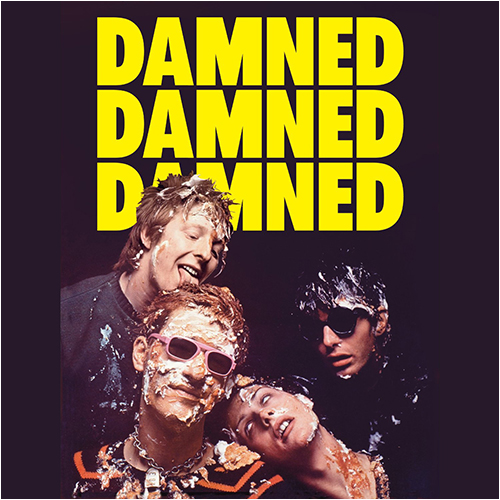
Damned - Damned Damned Damned (35th Anniversary)
UMC
Released: 3rd December 2012
As far as the music is concerned, these are recordings you should have. Though often regarded as the also-rans of punk in comparison to the Clash and the Pistols, it was the Damned who paved the way for the others with the first punk album and single releases, the Damned who could play their instruments, the Damned who believed punk music should be fast and raucous, and the Damned who remained true to the spirit of the age by signing to an independent label rather than waiting for the majors to come waving their cheque books around. Damned Damned Damned is a blitzkrieg of an album, twelve blistering tracks that will knock you off your feet, with the pressure never easing from the moment Sensible opens proceedings with his throbbing bass intro to 'Neat Neat Neat'. Rat Scabies urges things along with his hypersonic drumming, songwriter Brian James thrashes his guitar to within an inch of his life, and Dave Vanian's vocals remain the embodiment of calm menace, his appropriating of the Shangri-las' "Is she really going out with him?" at the start of debut single 'New Rose' one of the most imspired moments in recorded music history.
The extras are also worth having. The Peel Sessions all have the little jokey asides that distinguish them from the originals ('New Rose' begins with "Are we really 65 in the charts?") and most of them come in a few seconds shorter than the album versions meaning the band played them even faster! The live tracks capture the mood of an age we will never see again, while the b-sides include a version of the Beatles' 'Help' which you cannot help but love, the Damned's 100mph approach showing the old boys how things were really meant to be. The documentary and interviews are intriguing, revealing a real intelligence behind the band, and reopening old debates. Sex Pistol Glen Matlock denies being jealous of the Damned beating them to the release of the first punk records by insisting the Pistols were taking their time to produce something decent, while Sensible counters by accusing the Pistols of producing an album that sounds like Bad Company with Johnny Rotten singing. There's much more fascinating insight, loads of brilliant music and a book to boot. It's all great stuff, but is it worth the price?
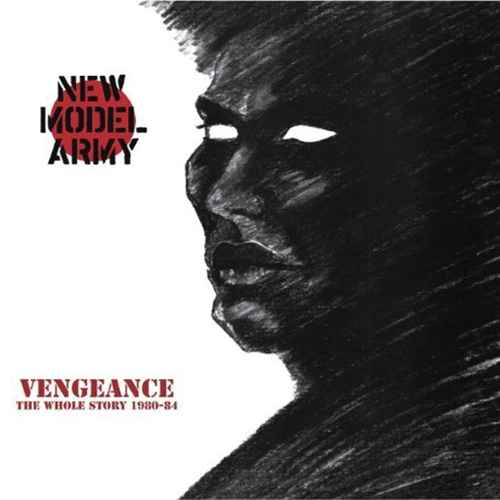
New Model Army - Vengeance (The Whole Story 1980-84)
Attack
Released: 10th December 2012
That would have been impressive enough if New Model Army hadn't had the ability to lay bare their humanity with such inate understanding; despairing at the weaknesses to which they were pray but demanding alternatives, taking the punishment this inflicted though clearly revelling in their youth and strength. They embodied the whole conundrum of human existence, struggling under a welter of conflicting hopes and desires, riddled with lust and guilt, wanting a better world but not being sure if they really deserved one. And they dressed these dilemmas in some astonishing music, simply melodic, ludicrously infectious, and built on the incredible bass playing of Stuart Morrow who gave the band's sound a whole new dimension. With Rob Heaton's punchy drumming and Justin Sullivan's stabbing guitar and searching vocals the band produced a whole series of fine records which have lost none of their power over the past thirty years. This new 2CD package released by the band themselves captures all of the recordings made before the band signed (controversially) for EMI and includes the singles 'Bittersweet', 'Great Expectations' and 'Nineteen Eighty-Four' with all of their accompanying b-sides as well as the mini album Vengeance, three collections of Radio One Sessions and nine unreleased demo tracks recorded from 1980 to 1984. Packaged in a hardback cover with a booklet containing the lyrics to the Vengeance tracks, it would be good if this was the start of a series of reissues of the band's other albums (most of the EMI releases are unavailable in the UK), but it is unlikely they would be able to recover the rights to those works as easily.
But if these songs are all we have, then we have enough as the quality of some of the tracks here is simply staggering. Can anyone listen to 'A Liberal Education' unmoved? Has there ever been a better b-side than 'No Man's Land'? Is 'Waiting' the best song ever written? Probably not, but you can't fail to be swept away by the spirit here, the hope of it all, and the sheer unbridalled humanity. And if New Model Army once make you think whether there may be a better path for our lives, then the war was well worth waging.

